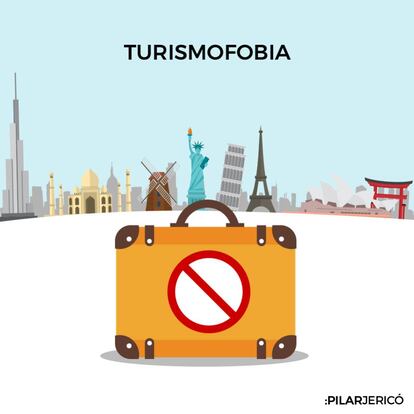An essential guide to surviving the busy vacation season
There are deep-rooted sociological reasons behind your discomfort when sharing limited spaces

You go to the beach and there’s no room for you to place your towel because of the sheer number of sunbathers. You go to a historical monument and you can’t take a picture without an endless stream of strangers in the background. If in these moments you’re bursting with anger and hoping all the other tourists would just disappear, you’re not alone. It’s due to our “animalist discomfort” when we lose the physical space we desire, sociology tells us.
In 1959, leading US anthropologist Edward T. Hall published The Silent Language, a book analyzing how people interact with the space around them. “Every living being has limits that separate it from its outside environment,” Hall wrote. When those expected limits shift, uncomfortable emotions are awakened. If someone speaks to us from close up, we tend to take a step back to keep the space we desire. If a person is standing too far when you’re trying to tell them something important, you move towards them subconsciously.
Physical distance is determined by culture, character, who someone is talking to, and even mood
Hall measured these different distances. We enter the “intimate distance” when we talk to friends or family, which ranges from 15 to 45 centimeters. A “social distance” for business and social gatherings can range from 1.21 to 2.13 meters on the close end, to 2.13 to 3.65 meters, at the other end of the scale.
Each person needs to maintain a certain physical distance from other people, but this distance is decided by a variety of factors including culture, character, who someone is talking to, and even mood. But when there’s a crowd of people, our beloved required distance is shattered. That’s why it bothers us – our pure animal survival instincts have kicked in (in addition to the obvious inconveniences it causes).
This discomfort can be occasional or it can turn into a real phobia such as tourism-phobia, like that suffered by residents of beautiful cities. I saw this in Florence when living there years ago. Residents of Florence had their own entrances to restaurants along with exclusive showings at movie theaters, all so they could stay away from the tourists. Without going to this extreme, what can we do when we are assaulted by this discomfort while on vacation?
Start by accepting the feeling that wanting to be around fewer people is normal, ‒ and reciprocated – by the way. You are a stranger to the people around you as well. If it happens to you, you are neither more nor less rare, but in any case you can be more or less accommodating.
If we choose a place that’s coveted by the rest of the population, it must be for a reason
As we have seen, discomfort is an animal response. Now, let’s go on vacation where we want to go. Nobody is forcing us. If we choose a place that’s coveted by the rest of the population, it must be for a reason. Every place has its low seasons, including Mediterranean beaches. If you were to go in February, they would be empty, although it might be hard to swim without freezing.
Of course there are always the “hermit” options, although these are surely less attractive and accessible. So if you go somewhere and there are a lot of people, recognize the benefits, accept the price of the decision you’ve made and don’t be bitter about it.
Secondly, if you are on vacation in a crowded place, alter your schedule so you can enjoy some solitude. Have lunch before or after the rush, or get up early or late to be around less people.
If you are on vacation in a crowded place, alter your schedule so you can enjoy some solitude
Thirdly, when you’re surrounded by more people than you’d like, seek out the benefits, change your schedule, and look on the bright side. You may not be able to read a book peacefully, but you can meet people or observe behaviors, just as sociologists do.
In short, we all need to maintain a certain physical distance with strangers to feel good, but we also need to relax while on vacation. If there are too many people at your vacation spot, you know you’ve already chosen well. Accept it, recognize that you are also a stranger to everyone else, try and find calmer moments, and look for new activities to have a go at during these periods. Vacations are to be enjoyed, and not for regretting that everyone had the same idea as you.
English version by Debora Almeida.
Tu suscripción se está usando en otro dispositivo
¿Quieres añadir otro usuario a tu suscripción?
Si continúas leyendo en este dispositivo, no se podrá leer en el otro.
FlechaTu suscripción se está usando en otro dispositivo y solo puedes acceder a EL PAÍS desde un dispositivo a la vez.
Si quieres compartir tu cuenta, cambia tu suscripción a la modalidad Premium, así podrás añadir otro usuario. Cada uno accederá con su propia cuenta de email, lo que os permitirá personalizar vuestra experiencia en EL PAÍS.
¿Tienes una suscripción de empresa? Accede aquí para contratar más cuentas.
En el caso de no saber quién está usando tu cuenta, te recomendamos cambiar tu contraseña aquí.
Si decides continuar compartiendo tu cuenta, este mensaje se mostrará en tu dispositivo y en el de la otra persona que está usando tu cuenta de forma indefinida, afectando a tu experiencia de lectura. Puedes consultar aquí los términos y condiciones de la suscripción digital.








































